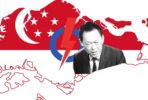
The Nahdatul Ulama and Muhamadiyah organisations will probably remain on their paths as modernist Muslim movements that address the challenges of modern Indonesia.
INDONESIAN POLLS: Can the state forestall the proliferation of new radical groups that chip at the country’s plural and democratic culture?
AS Indonesia heads to the polls next month, a range of political actors and parties have come to the fore to defend the country’s image and standing internationally, and to emphasise yet again the pressing need for Indonesia to defend its tolerant culture and beliefs.
More than a decade ago, it was feared that Indonesia would have been swept towards a rising tide of exclusive communitarian thinking that seemed poised to spread across that vast country.
Groups like the Laskar Jihad were waging what they regarded as a holy war against infidels, and Indonesia was hard-pressed to defend its reputation as a bastion of moderate Islamic thought and praxis.
Yet, despite the fears of many, Indonesia has been able to maintain its own cultural-historical course, and it remains a country where normative religiosity has not been overwhelmed by the culture of violence.
This is largely due to the important role played by the country’s mainstream Muslim organisations, notably the Nahdatul Ulama (NU) and the Muhamadiyah.
Today, as we watch the election campaign intensify, it is interesting to note how groups like the NU and Muhama-diyah remain steadfast in their stand against all forms of religious communitarianism and intolerance.
Take for instance the party-political TV ad for the Partai Kebangkitan Bangsa (PKB, National Awakening Party), which is the party-political offshoot of the NU.
The PKB’s ad features prominent leaders of the party reminding the viewers that Indonesia is not “like other Muslim countries”, and that Indonesian Islam has evolved along its own trajectory and has its own local character.
This is in keeping with the position taken by successive generations of the NU’s leadership, who have argued tirelessly that Southeast Asian Islam has to adapt to the realities of pluralism and diversity that is the norm in our part of the world.
It reminds us of the slogan coined by the late leader of the NU, Abdurrahman Wahid, who spoke of Indonesian Islam as being warna-warni: complex and with many hues. Today, that legacy of pluralism and diversity is being defended still by the NU and its party, the PKB.
The same can be said of the Muhamadiyah, that has been a reformist Islamic movement from the outset, and which has laid great emphasis on modern education, the sciences and a pragmatic approach to dealing with the question of diversity in culture and society.
Both the NU and Muhamadiyah have created a vast network of think tanks, publishing houses, intellectual and activist circles, etc. to consolidate their hold on the country’s Muslims and to disseminate ideas related to their vision of a modern, dynamic Islam.
Via bodies such as the LKiS research unit and publishing house and circles like the Jaringan Islam Muda Muhamadiyah (JIMM), the two mass movements have been defending Indonesian pluralism and diversity for decades.
But Indonesia today is a very different country than what it was two decades ago, and gone are the days where the NU and Muhamadiyah could propagate their brand of religious and philosophical thinking without being challenged.
In short, their view is no longer hegemonic and pervasive as it once was, and the reason for this lies in the erosion of state power as well as the opening up of public domains.
Since 1998, the once-invincible Indonesian state, that was centralised with power in the hands of the political-military elite, has been challenged by new political actors and agents across the country. The demand for more decentralisation of power has led to the emergence of competing power-bases and sites of discussion, and also opened the way for the rise of many smaller, yet vocal and demanding Islamist groups across the country.
Today, Indonesia’s Islamic arena is still dominated by the NU and Muhamadiyah, but it is being contested by groups as diverse as the Front Pembela Islam (FPI), the Hizb’ut Tahrir Indonesia (HTI) and even quasi-state bodies like the Majlis Ulama Indonesia (MUI) that has been busy issuing judgments on things as diverse as yoga and Facebook. As these new actors and agents enter the contested discursive arena, new debates are emerging and new concerns being raised.
Here lies the concern of many Indonesia watchers who wish to see Indonesia remain a peaceful and diverse country, for these new groups present a different, if somewhat homogenous and monolithic vision of what Indonesia should be.
Though they are small in number, their reach is greater thanks to the manner in which they have managed to capture the imagination of the young, poor, disenfranchised and the media. It is worrisome indeed when small groups of hardliners are given so much attention in the media, and when it is clear that such radical clusters have learned the art of media manipulation themselves. Over the past few years, these are the groups that have captured the headlines for their attacks on intellectuals, minorities and even other schools of Muslim thought.
As long as the public arena remains an open one where any new actor can enter and enunciate a different — sometimes provocative — stand on issues, groups like these will continue to thrive. The NU and Muhamadiyah may be able to command the loyalty and support of more than 70 million Indonesians, but it has to be remembered that in predominantly Muslim Indonesia today, there are around 200 million Muslim minds to win over.
So the question arises: Can Indonesia retain its reputation as the bastion of Muslim tolerance, pluralism and diversity?
The answer lies as much in mathematics as it does in ethics, for in the final analysis it is numbers that count. The NU and Muhamadiyah can, and probably, will remain on their appointed paths as modernist Muslim movements that address the challenges of modern Indonesia.
But if the state does not prevent or forestall the proliferation of the new radical groups that continue to chip at the country’s plural and democratic culture, this bastion, too, might fall in the future.
With these factors in mind, the coming elections in Indonesia will serve as a useful barometer of public sentiment and Muslim sensibilities, and so once again, I state the obvious: Indonesia’s coming elections are important not only for that country, but for the region and the Muslim world as well.
Written by Farish Noor
Source: New Straits Times






